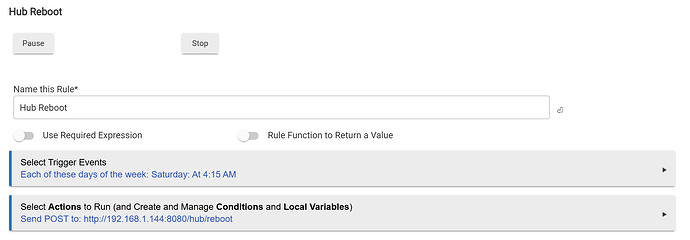Hey thanks, I got the reboot command working! I'm really glad you helped me find that community post, explaining the difference between "restart" and "reboot", where restart causes memory leaks due to it only restarting the JVM, not the Kernel OS. The results reported were disastrous, yikes!
There were 2 issues why "reboot" was not working for me:
- Network router security configuration.
- Not reverting from "restart" to "reboot" once I figured out how to fix the REAL issue to re-work the addressing of the command (e.g. don't code at 2AM, ugh).
The issue was NOT with the command (reboot/restart), rather the HTTP POST command being blocked by my router due to security configuration.
Perhaps others can learn from this, now given more enhanced security features in routers, which default to high security out of the box.
My router isolates iOT devices network traffic to prevent POST commands inadvertently/intentionally from any of the devices out side that group. e.g. So iOT devices network traffic is blocked/isolated from security risk to other devices on your lan, thwarting attacks. My Hub is configured as part of this isolated security group, by default.
I have my Hub configured with a static IP address, and used the post command as suggested, to the Hub's IP address, which should work.
However, the Router blocked this POST command from being set back to the hub, regardless of the fact that it was initiated from the Hub. The router security must recognize this as some spoofing attack, or is just how it's implemented... a new discovery.
Once I switched the POST command to a localhost address (127.0.0.0) since that's just a loopback command, this of course never left the device so voila, the command worked - both the restart AND as I just discovered the REBOOT command!
NOTE: Using localhost or static address was one of the options in a previous post in the thread, thanks for that getting me thinking of this work around.
Now the user error: I didn't revert the command to "reboot", having last re-wrote the command to use "restart", thinking that was the issue. and once I fixed the addressing issue, didn't update the command to "reboot". Lesson learned: don't debug at 2am, I should have learned that a long time ago 
Thanks again for your help, and everyone else on this thread.
I'm super impressed with the Hubitat community knowledge, contributions, and passion - and prompt reply to get me going.
-Jack


